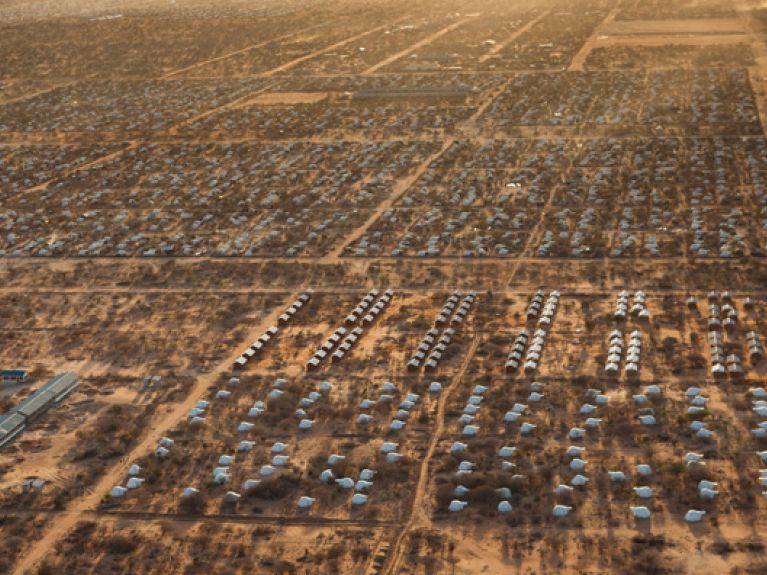Learning to understand what prompts migration
In a Master’s programme coordinated by University of Oldenburg, African and European partners jointly investigate the reasons behind global migration.

Rueben Okine still likes sitting in the library at the University of Oldenburg and is often to be found there. Oldenburg is in the north of Germany and it is the very first German city he encountered. “The weather is so-so but you can eat and cook well in Germany and I have got to know many fantastic people,” reports the migration expert and devoted amateur chef.
It was in Oldenburg that Okine recently completed his Master’s – a qualification that has taken him far beyond the borders of Germany. After studying Psychology the 34-year-old from Ghana’s capital of Accra initially worked for the Ghanaian government, where he was repeatedly confronted with the complex backgrounds to migration and diaspora. He asked himself, for example, what were the social and political implications of the fact that Ghanaians in exile cannot participate in elections in their own country. “I soon realized that I wanted to know more about the political aspects of refugees, equal opportunities, peacebuilding,” he explains.
Little education, very few perspectives
Migration is an important subject in Okine’s home country. There is a great deal of unemployment and poverty. According to figures put out by the German Federal Office for Migration and Refugees, in 2014, around one quarter of Ghana’s population was living below the breadline. “Many people, particularly young ones, are leaving Ghana. They cannot see any opportunities because schools and education are not a matter of course,” explains Okine. The result: The International Organization for Migration estimates that between six and eleven percent of Ghanaians are no longer resident in their country of origin.
A lack of opportunities, general squalor and oppression are the factors that drive many people to flee Africa, some of them heading to Europe and Germany. However, most of the refugees live in Africa itself. There are more than 2.5 million displaced persons in Nigeria alone and for the Democratic Republic of Congo the figure stands at 1.5 million.
In order to better understand the background to all of this Okine applied to University of Oldenburg, where, together with 25 fellow students from all over the world, some of them funded by scholarships from the European Union, he embarked on his studies for a European Master’s in Migration and Intercultural Relations (EMMIR) in 2014.
More mobility for better understanding
Established in 2011, EMMIR is the first African-European Master’s course on migration studies and is coordinated by the University of Oldenburg. It investigates global migration and to this end brings together universities from Sudan, Uganda and South Africa, Slovenia, the Czech Republic, Norway and Germany. “At the end of the requisite four semesters they produce a joint report,” explains Jan Kühnemund, lecturer and research assistant at Universität Oldenburg. Kühnemund is delighted that the Master’s will now be receiving funding of up to €2.9 million from the European Commission’s Erasmus Mundus programme of excellence for another five years. “At the end of the day, this is an instance of real internationalization in tertiary education,” comments Kühnemund.
Great mobility for the students through international cooperation agreements with universities and nongovernment organizations plus better mutual understanding thanks to a cross-disciplinary approach: These are EMMIR’s ambitious objectives. Additionally, students are quickly given hands-on experience. Okine has visited a reception centre for refugees in Norway, has been an intern at the African Diaspora Policy Centre – a nongovernment organization (NGO) in the Netherlands – and spent two months in Slovenia providing humanitarian assistance to refugees trying to get to Austria from there. “Sometimes I had to work through the night,” he remembers. “But although it is somebody in the office who decides the refugees’ fates, the preceding fieldwork is incredibly important if we are to better understand their motivations and the overall background.”
A great deal of practical experience
Kühnemund confirms this. “We attempt to burst the academic bubble as quickly as possible and to introduce the students to life in the real world.” This is why the students start off in Oldenburg, move on to the University of Stavanger in Norway for the second semester, and then continue their studies at partner universities in Slovenia, the Czech Republic, Norway, Germany, Uganda, Sudan and South Africa, depending on the focus of their interests and then undertake an internship with associated NGOs and organizations.
As Kühnemund explains, EMMIR is now in touch with some 50 organizations. Around half of these are based in Africa. “Many NGOs are very impressed with the interns we supply – partly because these young people provide them with food for thought,” he reports. Okine is considering becoming involved in working in one of the projects that he has got to know closer. But, as he reports, wherever his journey takes him next, his experiences – not only in the political, practical and academic contexts, but also with his fellow students – have been invaluable. “Spending the weekend together, watching football, talking about everything under the sun, politics and our own countries – that provides us with the kind of knowledge that cannot be gleaned from books.”

